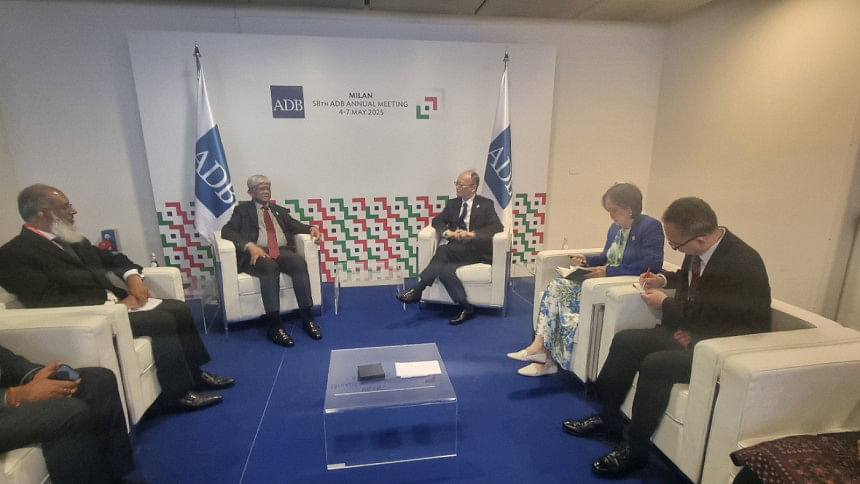Diplomatic Correspondent
Published:2025-05-08 17:27:57 BdST
ADB reaffirms strong support for BD’s reform agenda
The Asian Development Bank (ADB) has reiterated its unwavering commitment to Bangladesh’s reform-driven development and sustainable growth agenda as the country approaches graduation from Least Developed Country (LDC) status.
The assurance came during a bilateral meeting held on the sidelines of the ADB’s 58th Annual Meeting between ADB President Masato Kanda and Bangladesh’s Finance Adviser Dr Salehuddin Ahmed.
In the meeting, Dr Ahmed expressed Bangladesh’s deep appreciation for ADB’s long-standing development cooperation. He highlighted that ADB’s cumulative assistance to Bangladesh now stands at $32.5 billion, including $2.94 billion committed in the current fiscal year (FY 2023–24), supporting critical sectors such as infrastructure, energy, education, health, and climate resilience.
As Bangladesh prepares to transition out of LDC status, Dr Ahmed underscored the importance of recalibrating development assistance to align with the country’s evolving needs. He described the transition period as a historic moment marked by significant political and social reform, driven in part by a youth-led movement and a reform-mandated government.
He called on ADB to actively support the government's reform priorities—particularly in governance, public service delivery, and transparency.
Dr Ahmed proposed enhanced ADB engagement in several strategic areas to align with Bangladesh’s evolving development needs. These include advancing integrated river management alongside a comprehensive Blue Economy Master Plan, which would harness the country’s vast water resources for sustainable growth.
He also emphasized the importance of digitally transforming the health sector to improve service delivery and efficiency. Modernizing the tax administration was highlighted as a key step toward strengthening fiscal governance.
Additionally, Dr Ahmed called for investment in future-ready education and skills development to equip the next generation for a rapidly changing global economy.
On the urban front, he stressed the need for climate-resilient development, including the creation of smart cities and the enhancement of municipal services. Finally, he underscored the importance of expanding renewable energy capacity and promoting regional energy trade to ensure long-term energy security and sustainability.
“Enhanced concessional support from ADB is not only vital for sustaining Bangladesh’s development momentum, but also a strategic investment in regional stability, effective climate action, and inclusive growth,” Dr Ahmed said, urging ADB to tailor its financing instruments to the unique challenges faced by transitioning economies like Bangladesh.
ADB President Masato Kanda praised Bangladesh’s resilience and economic progress, reaffirming the Bank’s strategic focus on the country. He assured that the issues raised by the Bangladeshi delegation will be taken seriously and emphasized ADB’s enduring partnership with Bangladesh, promising continued support in ensuring the country’s social and economic security.
As Bangladesh embarks on this new phase of its development journey, the reaffirmed partnership with ADB is expected to play a crucial role in enabling the nation to achieve inclusive, resilient, and sustainable growth.
Unauthorized use or reproduction of The Finance Today content for commercial purposes is strictly prohibited.


